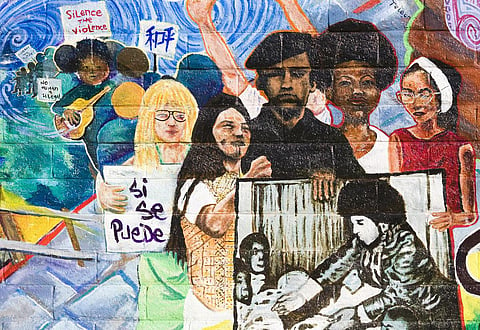OPINION: Fighting Racial Dialogue Fatigue
by Ralina L. Joseph
While I was facilitating a racial dialogue session today, a white woman expressed what so many of us are feeling around racial justice work right now: she said she was exhausted. In response, a BIPOC participant respectfully sighed, "I'm tired too, but I don't have the luxury to lie down."
How do we fight this fatigue together? Our summer of protest has been reignited by white police officers' attempted murder of 29-year-old Jacob Blake in Kenosha, Wisconsin. As Blake walked around his family SUV from passenger to driver side, the police shot him seven times. In the back. At point-blank range. And with his three children, ages 3, 5, and 8, inside the vehicle.
We all know that this isn't a unique story. As a result, some persevering folks continue to protest in their streets, workplaces, neighborhoods, and on the internet. Others deny facts, telling us, as Nikki Haley did at the RNC, "America is not a racist nation." And most of us, whatever side of the fight we're on, are fatigued by witnessing the continuous onslaught of racialized violence.
My form of witnessing is running a racial dialogue program. And in general, I like to think of myself as an optimist. I couldn't ask people to listen to racialized hurt, to talk about racialized violence, to share our racialized pain, if I didn't believe that we could, together, change hearts and minds, as well as structures and institutions.
But when individual actions (white police officers shooting Black people) continue to mimic institutional and structural action (government officials and police forces refusing to acknowledge the humanity of Blackness), my optimism drains. What greater articulation of individual racism emanating from structural racism is there than shooting a Black man in the back as his three children watch from the backseat? Just as Black men's lives do not matter, neither do Black children's.
Our children, our Black children, will witness the traumatic replays of this attempted murder. They will peer over our shoulders at the news, understanding that a man who might look like their father, uncle, cousin, big brother, or maybe even them in a few years is disposable in the eyes of police. Black children like the Gilliams, ages 6, 12, 14, and 17, are snatched out of their car and held at gunpoint in a mistaken case of car theft in Aurora, Colorado. Black boys like twelve-year-old Tamir Rice are murdered by a white police officer while playing with a toy gun in Cleveland, Ohio. Replays of such instances solidify and codify institutional racism: Black lives don't matter.
The fatigue comes to the fore. We sit in our fatigue because we mourn the loss of Black lives, we lament racialized violence, we celebrate Black life holding on despite being shot seven times. But we can't stay stuck in this fatigue because racial dialoguing, listening, talking, and intervening together creates change. I see this change happen in people — students, librarians, teachers, retirees, lawyers, tech workers — over the course of working together two hours, ten weeks, and sometimes longer, as participants come back to me months or years later to share their moment of awakening.
But to awaken, you have to work. I am witnessing a very real community fatigue with race-talk. Of the 45 members who eagerly signed up two months ago to enter into a discussion about how to talk about race, only 22 showed up today.
While we are all tired, white people, in particular, are beginning to give in to their fatigue.
I'm met with far more silence — and fewer white ally voices — than just one month ago, when we were settling into strategic and hope-filled dialogues of what worldwide racial protests could bring.
I'm met with far more silence — and fewer white ally voices — than two months ago when most of the country was discovering Juneteenth and reeling from a productive anger at the histories that have been hidden from them throughout traditional, whitewashed K—12 education.
I'm met with far more silence — and fewer white ally voices — than almost three months ago when George Floyd's murder brought people together to cry, to scream, to express their desire to do something, anything, to create change.
We are all tired. Indeed, I understand the fatigue. But please, let's stay in the work together. For Jacob Blake and his children. For the Gilliam children. For Tamir Rice. For all of us. Let's garner strength from Sweet Honey in the Rock's celebration of the mother of civil rights, Ella Baker:
"Struggling myself don't mean a whole lot, I've come to realize
That teaching others to stand up and fight is the only way my struggle survives"
Racial dialoguing is struggling together, standing up and fighting together, surviving together. We can't afford not to.
Dr. Ralina L. Joseph is a scholar, teacher, and facilitator of race and communication. She is Professor of Communication at the University of Washington in Seattle, where she has been on faculty since 2005. She is also the founding director, since 2015, of the Center for Communication, Difference, and Equity (CCDE) , and she recently began a position as associate dean of diversity in the Graduate School. Dr. Joseph's books and articles, including her current book project, Interrupting Privilege: The Promises and Perils of Talking Race and Fighting Racism, probe questions of race and racism in our world today.
Featured image is attributed to Thomas Hawk and is under a Creative Commons 2.0 license.
Help keep BIPOC-led, community-powered journalism free — become a Rainmaker today.


